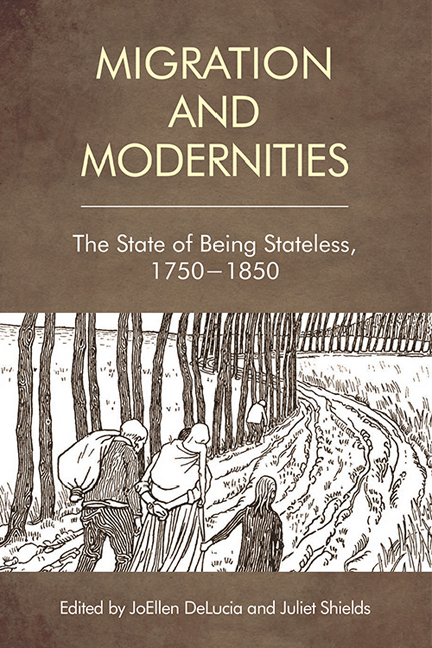1 - Byron’s Ambivalent Modernity: Touring and Forced Migration in Don Juan
Published online by Cambridge University Press: 05 May 2021
Summary
The work of George Gordon, Lord Byron, may seem an odd place to look for early discussions of migration and precarity. Why would we expect Byron – a landed nobleman and a poet renowned for his expansive knowledge of classics, politics, economics, and more – to understand the vulnerability of migrants and refugees? Yet Byron's poetic musings on his experiences as a social outcast and sexual refugee from his native land anticipate many later theoretical discussions of refugee status and migration. Most concretely and compellingly, Byron's satirical epic Don Juan (1819–24) offers a genealogy for the “regime of motion” Thomas Nail sees defining modern life. Working to “reinvent … political theory from the primacy of social motion rather than the state,” Nail argues that “The social compulsion to move produces certain expulsions for all migrants… . Migration in this sense is neither entirely free nor forced – the two are part of the same regime of social motion.” Byron's revision of epic form suggests more specifically that modern epic must operate in a world ruled by what Cindi Katz calls “vagabond capitalism,” a world in which human beings are disabled as moral and political agents, displaced from the stable certainties ostensibly provided by religious and moral codes. Operating within the constraints of vagabond capital, Byron's narrator (an aristocratic tourist) and his protagonist (the hapless vagabond Juan) appear strikingly different at first, but those differences dissolve over the course of the epic, as both figures suffer from precarity and strive to overcome it in different ways. Just as the plot of Don Juan undermines commonplace distinctions between tourists and vagabonds, so Byron's formal innovations develop an early poetics of precarity, at once undercutting moral ideals and developing mobility into a mode of peripatetic resilience.
The pages that follow pursue this argument through four steps. The chapter's first section examines the political economy of Don Juan: in place of Buonaparte's “noble daring” or Don Juan's seductive powers, Byron presents the ruling power of bankers, loans, and shopkeepers as holding the key to a world redefined as prison for all. In this vision of modernity, the alternative to prison is migration, though migration's illusion of freedom offers only a different experience of vulnerability.
- Type
- Chapter
- Information
- Migration and ModernitiesThe State of Being Stateless, 1750–1850, pp. 17 - 50Publisher: Edinburgh University PressPrint publication year: 2018



